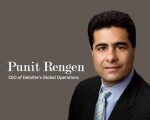Punit Renjen is chief executive officer of Deloitte Global. Previously, he served as chairman of the board, Deloitte LLP (U.S.), and prior to that, chairman and CEO of Deloitte Consulting LLP.
Outside of Deloitte, Punit is a member of the boards of directors at United Way Worldwide, US-India Business Council, and Japan Society; and a member of the board of trustees for the US Council for International Business. He speaks regularly on research regarding the attributes of exceptional organizations, particularly the importance of a well-articulated and lived workplace culture of purpose.
Punit has held several leadership roles within Deloitte, including CEO of Deloitte Consulting LLP in the US member firm. During his tenure as US Consulting CEO, the US consulting practice experienced tremendous growth despite an ongoing recession, helping it to become one of the largest consulting organizations according to leading analysts’ rankings.
Punit was born and raised in India. He attended Willamette University in Oregon where he earned a master’s degree in management, and now serves on the board of trustees. In 2015, Punit was named among the 100 most influential business leaders who have graduated from schools accredited by the Association to Advance Collegiate Schools of Business International. He is married and has a son.
"Confidence — it fuels business investments, innovation, and long-term growth. However, the current climate of uncertainty has greatly diminished that confidence slowing economic recovery."
Building business confidence; driving growth
For the past three years, Renjen has commissioned the Deloitte Core Beliefs & Culture Survey. The 2014 survey found that focusing on purpose rather than profits builds business confidence and drives investment. This is a critical finding — and underscores the significant impact a “culture of purpose” can play in fostering a thriving community.
An array of key indicators shows an economy of fits and starts. Everything from hiring to business inventories is up one month and down the next. As a result, many businesses continue to sit on excess capital rather than put it to productive use. But not all businesses. Those committed to creating meaningful impact for all stakeholders (including clients, employees, and communities) foster strong cultures of purpose. This sense of purpose inspires confidence among leaders and stakeholders alike — and can lead to a competitive advantage in a time of economic volatility.
